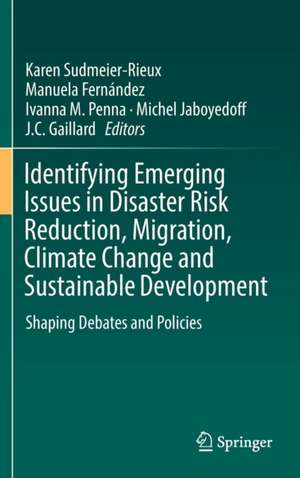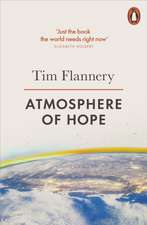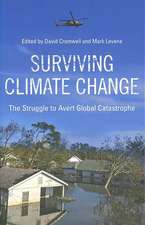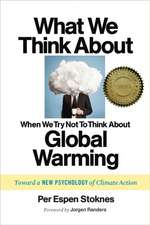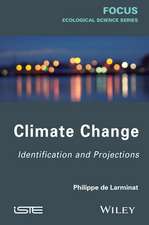Identifying Emerging Issues in Disaster Risk Reduction, Migration, Climate Change and Sustainable Development: Shaping Debates and Policies
Editat de Karen Sudmeier-Rieux, Manuela Fernández, Ivanna M. Penna, Michel Jaboyedoff, J. C. Gaillarden Limba Engleză Hardback – 5 sep 2016
| Toate formatele și edițiile | Preț | Express |
|---|---|---|
| Paperback (1) | 944.82 lei 6-8 săpt. | |
| Springer International Publishing – 11 iun 2018 | 944.82 lei 6-8 săpt. | |
| Hardback (1) | 950.96 lei 6-8 săpt. | |
| Springer International Publishing – 5 sep 2016 | 950.96 lei 6-8 săpt. |
Preț: 950.96 lei
Preț vechi: 1159.71 lei
-18% Nou
Puncte Express: 1426
Preț estimativ în valută:
181.99€ • 197.61$ • 152.87£
181.99€ • 197.61$ • 152.87£
Carte tipărită la comandă
Livrare economică 22 aprilie-06 mai
Preluare comenzi: 021 569.72.76
Specificații
ISBN-13: 9783319338781
ISBN-10: 3319338781
Pagini: 300
Ilustrații: XXI, 281 p. 38 illus., 33 illus. in color.
Dimensiuni: 155 x 235 x 18 mm
Greutate: 0.6 kg
Ediția:1st ed. 2017
Editura: Springer International Publishing
Colecția Springer
Locul publicării:Cham, Switzerland
ISBN-10: 3319338781
Pagini: 300
Ilustrații: XXI, 281 p. 38 illus., 33 illus. in color.
Dimensiuni: 155 x 235 x 18 mm
Greutate: 0.6 kg
Ediția:1st ed. 2017
Editura: Springer International Publishing
Colecția Springer
Locul publicării:Cham, Switzerland
Cuprins
1. Exploring linkages between disaster risk reduction, climate change adaptation, migration and sustainable development.- 2. Human mobility in a socio-environmental context: complex effects on environmental risk.- Part 1. Disaster risk reduction.- 3. Disaster risk reduction in the era of ‘homeland security’; the struggle for precautionary, preventive, and non-violent approaches.- 4. Water related risks in the area of Dakar, Senegal: coastal aquifers exposed to climate change and rapid urban development.- 5. Dike Risk: Revealing the academic links between disaster risk reduction, sustainable development, climate change and migration.- 6. Jakarta – Mumbai: Two Megacities Facing Floods Engaged In A Marginalization Process Of Slum Areas.- 7. The Necessity of Early Warning Articulated Systems (EWASs): Critical Issues Beyond Response.- Part 2. Migration.- 8. Applications of disaster risk reduction principles and operational mechanisms to migration in contexts of instability.- 9. Linking migration, mobility and development for strengthening adaptation to climate and disaster risks. Reflections from Nepal.- 10. Overcoming Land Tenure Barriers in Shelter and other Reconstruction Activities in Post-Disaster Settings.- 11. Impacts of Outmigration on Land Management in a Nepali Mountain Area.- Part 3. Climate change adaptation.- 12.Reflections on disaster diplomacy for climate change and migration.- 13. Local Knowledge For Addressing Climate Change Risks At Local Level – A Case Study from Nepal.- 14. Building Farm Resilience in a Changing Climate: Challenges, Potentials, and Ways Forward for Smallholder Cocoa Production in Bolivia.- 15. The role of traditional knowledge to frame understanding of migration as adaptation to the “slow disaster” of sea level rise in the South Pacific.- 16. Conclusions – linking sustainable development, disaster risk reduction, climate change adaptation, migration and resilience – policy implications.
Notă biografică
Dr. Michel Jaboyedoff is a geologist and has a degree in physics and a PhD degree in clay mineralogy. Since 2005, he is a full professor at the University of Lausanne, focusing his research on natural hazards and related risks. He is working on integrated risk analysis in Switzerland and developing countries, looking at the impact of hazards on society. Ms. Manuela Fernandez has a degree in political science from the University of Buenos Aires (Argentina) and a Master’s degree in Geography from the University of Lausanne (Switzerland). She is currently completing a PhD at the University of Lausanne. Prof. J. C. Gaillard is Associate Professor at The University of Auckland in New Zealand. His present work focuses on developing participatory tools for disaster risk reduction and in involving marginalized groups in disaster-related activities with an emphasis on ethnicity, gender, prisoners and homeless people. JC Gaillard also collaborates in participatory mapping and community-based DRR trainings with NGOs, local governments and community-based organizations in Asia and the Pacific. Dr. Ivanna M. Penna is a researcher at the University of Lausanne, Centre for Research on Terrestrial Environments of the University of Lausanne. She completed her PhD at the Department of Geological Sciences from the University of Buenos Aires (Argentina), on large landslide occurrence in the Southern Central Andes of Argentina, with a specialization on assessment and management of geological and climate related risk, at the University of Geneva (Switzerland). Dr. Karen Sudmeier-Rieux is a senior researcher at the University of Lausanne, Centre for Research on Terrestrial Environment where she manages two research projects on landslide risk, bio-engineering, migration, resilience and vulnerability of mountain communities in Western Nepal.
Textul de pe ultima copertă
The goal of this book is to explore disaster risk reduction (DRR), migration, climate change adaptation (CCA) and sustainable development linkages from a number of different geographical, social and natural science angles. Well-known scientists and practitioners present different perspectives regarding these inter-linkages from around the world, with theoretical discussions as well as field observations. This publication contributes in particular to the discussion on the Sendai Framework for Disaster Risk Reduction (SFDRR) 2015-2030 and the debate about how to improve DRR, including CCA, policies and practices, taking into account migration processes from a large perspective where both natural and social factors are crucial and mutually “alloyed”. Some authors see the SFDRR as a positive step forward in terms of embracing a multitude of issues, others doubting that the agreement will lead to much concrete action toward real action on the ground. This book is a timely contribution for researchers, students and policy makers in the fields of environment, human geography, migration, disaster and climate change studies who seek a more comprehensive grasp of contemporary development issues.
Caracteristici
Addresses the nexus between migration, climate change adaptation and disaster risk reduction within the context of sustainable development
Provides a systematic discussion of differential risk processes and outcomes for mobile and non-mobile populations affected by the population movements
Discusses how to shape disaster risk reduction policies that are more effective considering migration challenges
Includes supplementary material: sn.pub/extras
Provides a systematic discussion of differential risk processes and outcomes for mobile and non-mobile populations affected by the population movements
Discusses how to shape disaster risk reduction policies that are more effective considering migration challenges
Includes supplementary material: sn.pub/extras
